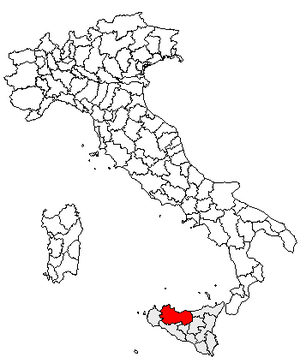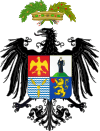Province of Palermo facts for kids
Quick facts for kids
Province of Palermo
Palermo
|
||
|---|---|---|
|
||
 |
||
| Country | ||
| Region | Sicilia | |
| Capital | Palermo | |
| Area | ||
| • Total | 4,992 km2 (1,927 sq mi) | |
| Population
(2004)
|
||
| • Total | 1,235,923 | |
| • Density | 248/km2 (640/sq mi) | |
| Postal Code |
90010, 90010-90035, 90037-90049, 90100
|
|
| Telephone prefix |
091, 0921, 0924
|
|
| ISTAT | 082 | |
| Vehicle registration | PA | |
| No. of communes | 82 | |
The Province of Palermo was a special area in Sicily, a large island that is part of Italy. Think of it like a big county or district. It was located on the northern coast of Sicily, right by the beautiful Tyrrhenian Sea.
The main city and capital of this province was Palermo. This city is famous for its long history, amazing buildings, and lively culture. The province was home to many towns and villages, each with its own unique charm.
Contents
What is a Province?
In Italy, a province is a type of local government area. It's bigger than a city but smaller than a region. The Province of Palermo helped manage things like roads, schools, and local services for the people living there. It was one of nine provinces in Sicily.
Geography and Nature
The Province of Palermo had a very interesting landscape. It stretched from the sunny coastline with its sandy beaches to rugged mountains in the interior. The Tyrrhenian Sea borders it to the north, offering stunning views and opportunities for fishing and boating.
The area includes parts of the Madonie Mountains, which are home to a natural park. This park protects many different kinds of plants and animals. You can find forests, caves, and even some rare species there. The varied landscape means you can go from a beach to a mountain trail in a relatively short distance.
History of Palermo Province
The area around Palermo has a very long and rich history. People have lived here for thousands of years! Ancient civilizations like the Phoenicians and Greeks settled here, followed by the Romans, Arabs, and Normans. Each group left its mark, influencing the culture, architecture, and even the food.
The city of Palermo, the capital, was especially important. It was a major trading port and a center for different empires throughout history. This mix of cultures makes the province a fascinating place to explore, with ancient ruins and historic buildings around every corner.
Culture and Traditions
The culture of the Province of Palermo is vibrant and full of life. It's a mix of all the different peoples who have lived there over centuries.
Food
Sicilian food is famous worldwide, and Palermo is no exception! You can find delicious street food like arancini (fried rice balls) and panelle (chickpea fritters). Sweet treats are also very popular, especially cannoli (crispy pastry shells filled with sweet ricotta cheese) and cassata (a colorful cake with candied fruit). Many dishes use fresh seafood, local vegetables, and olive oil.
Festivals
Throughout the year, the province celebrates many traditional festivals. These often involve colorful parades, music, and special foods. Religious festivals are very important, with processions honoring patron saints. These events are a great way to experience the local traditions and community spirit.
Main City: Palermo
The city of Palermo is the heart of the province. It's a bustling city with a unique charm. The Palermo Cathedral is a must-see, showing off different architectural styles from its long history. The Norman Palace (also known as the Royal Palace) and its amazing Palatine Chapel are also incredible examples of the art and history of the region.
Palermo also has lively markets, like the Ballarò and Vucciria markets, where you can find fresh produce, spices, and local crafts. Exploring these markets is a fun way to experience daily life in the city.
Economy
The economy of the Province of Palermo has traditionally relied on farming, especially citrus fruits like oranges and lemons, and olives. Fishing is also important along the coast.
In more recent times, tourism has become a very big part of the economy. People from all over the world visit the province to see its historical sites, enjoy its beautiful beaches, and experience its unique culture. Services, trade, and small businesses also play a key role in the local economy.
Government
Like other provinces in Italy, the Province of Palermo had a local government. It was led by a President, who was responsible for managing the province's affairs and working with the different towns and communes within its borders. The President and other elected officials worked to improve the lives of the people living in the province.
See also
 In Spanish: Provincia de Palermo para niños
In Spanish: Provincia de Palermo para niños
 | Frances Mary Albrier |
 | Whitney Young |
 | Muhammad Ali |


